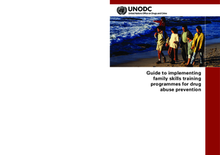Supportive families are essential to raising socially, mentally and physically healthy and well-adjusted children and preventing later adolescent problems. The challenges faced by many parents around the world as they try to provide for their families include balancing family and work life, juggling financial commitments, ensuring adequate support and social contacts and finding time for the family to be together. Sometimes parents struggle with substance abuse problems, which affects their parenting skills. Factors such as a lack of security, trust and warmth in parent-child relationships, a lack of structure in family life and inappropriate discipline practices and insufficient limit-setting can render children at greater risk of problem behaviours and subsequent substance abuse and mental health disorders.
Family skills training programmes have been found to be effective in preventing many of these risky behaviours, including substance abuse. Research findings confirm that skills training produces better results than do programmes that provide parents only with information about substances.
As part of its efforts to promote evidence-based practice, the United Nations Office on Drugs and Crime (UNODC) initiated a review of family skills training programmes and the evidence of their effectiveness worldwide. This Guide has been compiled on the basis of the review of family skills training programmes, the meeting and a literature review and focuses on providing basic information and guidance to those policymakers and programme managers interested in launching a family skills training programme at the universal or selective level.
- Chapter II of the Guide explores the evidence of the family as both a protective and a risk factor in child and youth development and the evidence of the effectiveness of family skills training programmes.
- Chapter III sets out 12 basic principles for launching an effective family skills training programme. Many family skills training programmes have been evaluated and some have been replicated in different settings.
- Chapters IV, V and VI are devoted to discussing major implementation challenges and ways to overcome them.
- Chapter IV is devoted to the process of culturally adapting an existing evidence-based programme.
- Chapters VI and VII are devoted to basic implementation issues such as training and support of staff, monitoring and evaluation and sustainability.
- The final chapter of the Guide provides an overview of the major points made in each earlier chapter, namely the evidence and effectiveness of family skills training programmes and the protective and risk factors in the family. A brief outline of the principles of a family skills training programme is given.

